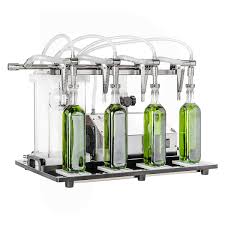Bottle filling machines play a vital role in automated packaging systems across many industries, including food and beverage, cosmetics, pharmaceuticals, and chemicals. These machines are designed to fill liquids into containers quickly, accurately, and hygienically.

The choice of bottle filling machine depends on several factors:
- Product viscosity (thin like water or thick like syrup)
- Foaming properties
- Container size and shape
- Required fill accuracy
- Production speed and automation level
Let’s explore the six most common types of bottle filling machines, along with their working principles, typical applications, and pros and cons.
1. Gravity Fillers
Overview
Gravity fillers rely on the natural force of gravity to transfer liquid from a tank into the bottle. They are ideal for thin, non-viscous, free-flowing liquids.
Suitable For:
- Water
- Juice
- Alcohol
- Liquid cleaners
- Solvents
Advantages:
- Simple design, low maintenance
- Cost-effective
- Gentle filling for delicate products
Limitations:
- Not ideal for thick or foamy liquids
- Slower than pressurized systems
2. Overflow Fillers
Overview
Overflow fillers fill bottles to a visually consistent level, which is especially important for transparent containers. Excess liquid overflows back into the tank, ensuring an even appearance.
Suitable For:
- Shampoo and body wash
- Cleaning products
- Essential oils
- Beverages in clear bottles
Advantages:
- Excellent visual consistency
- Prevents overfilling
- Suitable for foamy liquids with special nozzles
Limitations:
- Not the best choice for highly viscous products
- Slightly more complex than gravity systems
3. Piston Fillers
Overview
Piston fillers use a mechanical piston to draw a specific volume of product into a chamber and then push it into the container. This system is ideal for viscous products or those with particulates.
Suitable For:
- Creams and lotions
- Sauces and condiments
- Honey
- Paste-like products
Advantages:
- Highly accurate volume control
- Handles thick or chunky products
- Can fill a wide range of container sizes
Limitations:
- Slower cycle speeds for high-volume needs
- More moving parts = more maintenance
4. Pump Fillers
Overview
Pump fillers use gear, peristaltic, or diaphragm pumps to move product into the container. These are highly versatile and suitable for a range of viscosities.
Suitable For:
- Pharmaceuticals and essential oils
- Cosmetics and serums
- Chemicals
- Corrosive or foaming liquids
Advantages:
- Flexible for a wide variety of liquids
- Works with small or high-precision fills
- Peristaltic pumps are ideal for sterile fills
Limitations:
- May require product-specific pump heads
- Needs calibration for consistent output
5. Pressure Fillers
Overview
Pressure fillers are designed for carbonated or pressurized liquids. They inject liquid under pressure to prevent foam and retain carbonation during filling.
Suitable For:
- Soda
- Sparkling water
- Beer
- Kombucha
Advantages:
- Maintains carbonation
- Faster fill speeds for pressurized products
- Reduces foaming and overflow
Limitations:
- More complex machinery
- Higher cost than gravity or piston systems
6. Net Weigh Fillers
Overview
These machines use load cells to measure the weight of product being dispensed into each bottle. This ensures extremely accurate filling, especially for expensive or regulated products.
Suitable For:
- Cooking oils
- Nutraceutical liquids
- Agricultural chemicals
- Specialty chemicals
Advantages:
- Very high accuracy
- Minimal product waste
- Ideal for high-value liquids
Limitations:
- Slower speed than volume-based fillers
- More expensive and complex system
Comparison Table
| Filler Type | Best For | Accuracy | Viscosity Range | Automation |
|---|---|---|---|---|
| Gravity Filler | Water, juice | Medium | Low | Manual to Semi |
| Overflow Filler | Clear bottle liquids | High | Low to Medium | Semi to Auto |
| Piston Filler | Sauces, gels, creams | High | Medium to High | Semi to Auto |
| Pump Filler | Oils, chemicals | High | Low to High | Semi to Auto |
| Pressure Filler | Carbonated drinks | Medium | Low | Automatic |
| Net Weigh Filler | Oils, expensive liquids | Very High | Low to Medium | Automatic |
Final Thoughts
Choosing the right type of bottle filling machine is essential for ensuring efficiency, accuracy, and product quality in your production line. Whether you’re filling water or thick lotions, there’s a specialized solution that matches your product’s viscosity, container type, and output needs.
Investing in the right filling system not only improves productivity but also enhances the consistency and professionalism of your packaging—which matters more than ever in today’s competitive market.